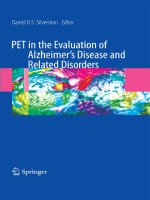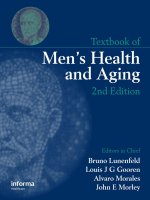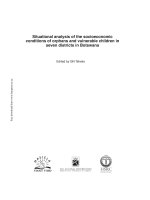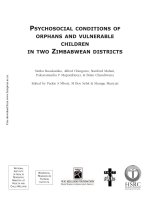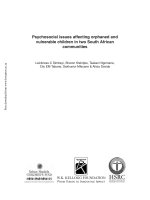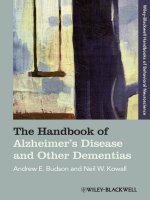The WK Kellogg Foundation''''s Orphans and Vulnerable Children Project pdf
Bạn đang xem bản rút gọn của tài liệu. Xem và tải ngay bản đầy đủ của tài liệu tại đây (728.2 KB, 96 trang )
Free download from www.hsrcpress.ac.za
The W.K. Kellogg Foundation’s
Orphans and Vulnerable Children Project
Interventions in Botswana, South Africa and Zimbabwe
Edited by Kgobati Magome
Published by HSRC Press
Private Bag X9182, Cape Town, 8000, South Africa
www.hsrcpress.ac.za
© 2006 Human Sciences Research Council, Family AIDS Caring Trust, Nelson Mandela
Children’s Fund, Masiela Trust Fund
First published 2006
All rights reserved. No part of this book may be reprinted or reproduced or utilised in
any form or by any electronic, mechanical, or other means, including photocopying
and recording, or in any information storage or retrieval system, without permission
in writing from the publishers.
ISBN 0-7969-2140-7
Production management by comPress
Distributed in Africa by Blue Weaver
PO Box 30370, Tokai, Cape Town, 7966, South Africa
Tel: +27 (0) 21 701 4477
Fax: +27 (0) 21 701 7302
email:
www.oneworldbooks.com
Distributed in Europe and the United Kingdom by Eurospan Distribution Services (EDS)
3 Henrietta Street, Covent Garden, London, WC2E 8LU, United Kingdom
Tel: +44 (0) 20 7240 0856
Fax: +44 (0) 20 7379 0609
email:
www.eurospanonline.com
Distributed in North America by Independent Publishers Group (IPG)
Order Department, 814 North Franklin Street, Chicago, IL 60610, USA
Call toll-free: (800) 888 4741
All other enquiries: +1 (312) 337 0747
Fax: +1 (312) 337 5985
email:
www.ipgbook.com
Free download from www.hsrcpress.ac.za
CONTENTS
List of figures v
Preface vi
Contributors and acknowledgements vii
Acronyms and abbreviations viii
Chapter 1: Introduction 1
What the project is about 1
How the project is organised 1
Methodology 1
Focus area 1: Home-based child-centred
development programmes 3
Chapter 2: Botswana 5
Maun Counselling Centre – Motse Wa Tsholofelo Day Care Centre 5
Kgodisong Day Care Centre for Orphaned Children 8
Bana Ba Keletso Orphan Day Care Centre 10
Mother’s Union Centre Mahalapye 12
Little Friends Centre for Orphaned Children in Serowe 13
Chapter 3: South Africa 15
Matjhabeng HIV/AIDS Consortium 15
Tapologo 17
Chapter 4: Zimbabwe 21
Family AIDS Caring Trust (FACT) Nyanga 22
DAPP Kukwanisa, Mutasa 23
Nzeve Deaf Children’s Centre 25
Intermediate Technology Development Group (ITDG), Chimanimani 27
Tjinyunyi Babili Trust 29
Midlands AIDS Service Organisation (MASO) 31
Batsirai Group 35
Farm Orphan Support Trust 36
Focus area 2: Family and household support
programmes 39
Chapter 5: Botswana 41
Maun Counselling Centre and Bana Ba Keletso (Molepolole) 41
Chapter 6: South Africa 43
Matjhabeng HIV/AIDS Consortium 43
Chapter 7: Zimbabwe 45
FACT Nyanga 45
DAPP Kukwanisa, Mutasa 46
Nzeve Deaf Children’s Centre 46
Tjinyunyi Babili Trust 47
Midlands AIDS Service Organisation (MASO) 48
Batsirai Group 49
Free download from www.hsrcpress.ac.za
Focus area 3: Strengthening of community
support systems 51
Chapter 8: Botswana 53
Maun Counselling Centre and Bana Ba Keletso 53
Chapter 9: South Africa 55
Mathjabeng HIV/AIDS Consortium 55
Tapologo-Heartbeat 56
Chapter 10: Zimbabwe 59
Nzeve Deaf Children’s Centre 59
ITDG Chimanimani 59
Tjinyunyi Babili Trust 60
Midlands AIDS Service Organisation (MASO) 61
Batsirai Group 62
Focus area 4: HIV/AIDS awareness, advocacy
and policy programmes 65
Chapter 11: Botswana 67
Maun Counselling Centre and Bana Ba Keletso Centres 67
Chapter 12: South Africa 69
Mathjabeng AIDS Consortium 69
Chapter 13: Zimbabwe 71
FACT Nyanga 71
DAPP Kukwanisa, Mutasa 71
Nzeve Deaf Children’s Centre 72
ITDG Chimanimani 72
Tjinyunyi Babili Trust 73
Midlands AIDS Service Organisation (MASO) 74
Batsirai Group 74
Observations and lessons 77
Chapter 14: Strengths and opportunities 79
Appendices and References 81
Appendix 1: The vulnerability assessment tool – FACT, Zimbabwe 83
Appendix 2: Pair-wise/preference ranking 84
References and sources 86
Free download from www.hsrcpress.ac.za
v
Figure 1 Geographical location of the five intervention sites in Botswana 5
Figure 2 Geographical location of the two intervention sites in South Africa 15
Figure 3 Geographical location of the eight interventions sites in Zimbabwe 21
v
LIST OF FIGURES
Free download from www.hsrcpress.ac.za
vi
In 2002, the WK Kellogg Foundation commissioned the HSRC to manage the
conceptualisation and implementation of a research-driven, evidence-based intervention
programme to assist children, households and communities affected by HIV and AIDS in
South Africa, Botswana and Zimbabwe. The main purpose of the project is to develop
‘models of best practice’ that will underly and facilitate the development of community-
driven strategies to respond to the increasing burden of orphans and vulnerable children
(OVC) in Africa. The project has four focus areas and a series of goals, each with a set
of deliverables.
1
This publication is one in a series that forms part of the key deliverables for Goal B of
the project. In terms of this goal, the documentation of the interventions implemented
by the different partners participating in the project is key to the process of determining
what works and what therefore constitute ‘models of best practice’ in each project focus
area. This report provides a detailed summary of the various interventions implemented
across Botswana, South Africa and Zimbabwe in all four focus areas, namely:
• Home-based child-centred development programmes;
• Family and household support programmes;
• Strengthening of community-support systems and;
• HIV/AIDS awareness, advocacy and policy programmes.
The publication is a sequel to an earlier HSRC publication on the same subject (Dlamini
2004). While the earlier publication focused on a select number of interventions, this
publication reports on all interventions that form part of this project in all three countries
so far.
The information provides the raw material for the next phases of the project, and will
eventually lead to the development of best practice models for community-driven care
of OVC.
PREFACE
1 For more information, refer to the Operational Framework to Implement Strategy for the Care of Orphans and
Vulnerable Children in Botswana, South Africa and Zimbabwe (HSRC 2004).
Free download from www.hsrcpress.ac.za
vii
This publication was made possible through the professional and technical contributions
of the following researchers from HSRC and its various partner organisations.
Botswana: Partner organisation: The Masiela Trust – Reba Phakedi, Gao Mosweu, Keeme
Mokgadi and Tselanngwe Matlhaku
South Africa: Research team: Leickness Simbayi and Donald Skinner
Partner organisation: The Nelson Mandela Children’s Fund – Tshepo Mdwaba, Jacky
Lingalo and Meacala Vosloo.
Zimbabwe: Research team: Shungu Munyati, Brian Chandiwana, S Rusakaniko,
F Mupambirei, S Mahati, J Mutsvangwa, N Chimbindi, T Mutsvari, A T Moyana, S Gwini,
S Buzuzi, K Mutambanengwe, and M Chirehwa.
Partner organisation: FACT – Jephias Mundondo, Greater Nhiwatiwa, Perkins Machanganje,
Rudo Chinogumira, Stewart Mudewe, Veronica Nhemachena, Ben C Mbaura,
S Kabungaidze, Linda Walker, Alois Sibanda, Melta Moyo, and Mrs Dhlodhlo.
We appreciate the efforts of Dr Olive Shisana, the Principal Investigator on the project,
who provided overall leadership.
CONTRIBUTORS AND ACKNOWLEDGEMENTS
vii
Free download from www.hsrcpress.ac.za
viii
viii
ACRONYMS AND ABBREVIATIONS
ADRA Adventist Development Relief Agencies
AIDS Acquired immunodeficiency syndrome
AREX Agriculture Research and Extension
BBDT Bulilimamangwe Business Development Trust
BOCAIP Botswana Christian AIDS Interventions Programme
BEAM Basic Education Assistance Module
BRTI Biomedical Research and Training Institute
CABA Children affected by AIDS
CADEC Catholic Development Association
CBO Community-based organisation
CDC Centres for Disease Control
CCC Child care coordinator
CCW Child care workers
CCG Child caregivers
CHH Child-headed household
CIHP Centre for International Health Policy
CIMMYT International Maize and Wheat Improvement Centre
CRS Catholic Relief Services
CWC Child welfare committee
DAAC District AIDS action committee
DAMSEC District AIDS Multi-Sectoral Committee
DAPP Development Aid from People to People
ECD Early Child Development
ECEC Early Childhood Educational Certificate
EHT Environmental health technician
EIC Information, education and communication
FACT Family AIDS Caring Trust
FAMSA Family and Marriage Society of South Africa
FBO Faith-based organisation
FGD Focus group discussions
FOST Farm Orphan Support Trust
GTZ German Agency for Technical Cooperation
HIV Human immunodeficiency virus
IEC Information, education and communication
IGA Income generating activity
Free download from www.hsrcpress.ac.za
ix
IGP Income generating project
IRDP Integrated rural development programme
ISAL Internal savings and lending
ITDG Intermediate Technology Development Group
JAZ Junior Achievement in Zimbabwe
JCR Justice for Children’s Rights
KMD Kerklik Maatskaplike Diens
KOSH Klerksdorp, Orkney, Stilfontein and Hartebeesfontein
MAC Matebeleland AIDS Council
MASO Midlands AIDS Support Organisation
MOH Ministry of Health and Child Welfare
NIHR National Institute of Health Research (former Blair Research Institute)
NGO Non-governmental organisation
NMCF Nelson Mandela Chidren’s Fund
NOVIP Dutch International Development Agency
OVV Oranje Vroue Vereeniging
OVC Orphans and vulnerable children
PLWA People living with AIDS
PMTCT Prevention-of-mother-to-child transmission
PRA Participation Rural Appraisal
RDP Reconciliation and development programme
SAT Southern African AIDS Trust
SCOPP Schools and Colleges Permaculture Programme
SDA Seventh Day Adventist
SDC School development committee
SPM Selection planning management
SPW Students Partnership Worldwide
SRH Sexual and reproductive health
STD Sexually transmitted diseases
STI Sexually transmitted infections
SWOT Strengths, weaknesses, opportunities and threats
TSURO Towards Sustainable Use of Resources Organisation
UNICEF United Nations International Children’s Fund
UCCSA United Congregational Church of Southern Africa
USA United States of America
Abbreviations and Acronyms
Free download from www.hsrcpress.ac.za
OVC Interventions in Botswana, South Africa & Zimbabwe
x
VAAC Village action AIDS committee
VDC Village development committee
VCG Voluntary caregiver
VCT Voluntary counseling and testing
VET Village extension teams
VTC Village trust committee
WAAC Ward action AIDS committee
YWCA Young Women’s Christian Association
ZRP Zimbabwe Republic Police
Free download from www.hsrcpress.ac.za
1
CHAPTER 1
Introduction
This report describes the substance of the various interventions implemented by the HSRC
and its donor partners in Botswana, South Africa and Zimbabwe, as part of the research-
driven, multi-country and multi-site intervention project on orphans and vulnerable
children (OVC), funded by the WK Kellogg Foundation. The report provides information
on what is happening on the ground and also the basic data required to develop ‘models
of best practice’. It is organised according to the project’s four focus areas: home-based,
child-centred development programmes; family and household support programmes;
strengthening of community-support systems and HIV/AIDS awareness, advocacy and
policy programmes, reported by country.
What the project is about
The main purpose of the OVC project is to develop ‘models of best practice’ that will
facilitate the development of community-driven strategies for responding to the increasing
burden of OVC in Africa. To achieve this, the project has been divided into two main
components: first, the research component – geared to gather useful information that
is necessary to inform the OVC strategy – and second, the interventions component
– geared to implement and test the OVC strategies and acquire information.
The specific objectives of the project are to:
• Improve the quality of life of OVC – including health, personal development and
social conditions.
• Support families and households coping with an increased burden of care for OVC.
• Strengthen community-based support systems as an indirect means to support
vulnerable children.
• Build capacity in community-based systems for sustaining care and support to OVC
and households, over the long term.
How the project is organised
The HSRC has identified a local non-governmental organisation (NGO) to serve as the
grant maker and the lead implementer of the project in each country. The grant maker
selects community-based organisations (CBOs) to participate in the project and implement
the interventions. CBOs are selected on the basis of the objectives of the project as
outlined above.
Methodology
The information reflected in this document was put together by a team of field officers
working on the projects both from within and outside the participating countries. In
order to ensure a uniform reporting frame, a pro-forma was developed for all to follow.
In addition, the principal author conducted site visits to document the interventions first
hand and fill in gaps where such existed.
Free download from www.hsrcpress.ac.za
2
Free download from www.hsrcpress.ac.za
FOCUS AREA 1
Home-based child-centred development
programmes
Free download from www.hsrcpress.ac.za
Free download from www.hsrcpress.ac.za
5
CHAPTER 2
Botswana
The HSRC works with the Masiela Trust Fund as the local grant maker in Botswana.
(The word ‘Masiela’ means orphans in Setswana). The trust was set up by Cabinet as
part of government’s response to the problem of orphans in Botswana. The trust’s main
function is to raise funds and allocate these to appropriate NGOs and CBOs working
with OVC within the country. The Masiela Board of Directors has representation from
the community, as well as key government ministries. The participation of high-level
government representatives has helped to give the trust a high profile and acquire support
from all sectors of society including the private sector. The trust currently enjoys financial
support from a wide range of businesses within Botswana. An advisory committee made
up of prominent people in the community plays an advocacy role.
The Masiela Trust Fund has selected five intervention sites to participate in this project.
Their geographic location is as shown in Figure 1.
Figure 1: Geographical location of the five intervention sites in Botswana
The following section outlines key information about each intervention site, and describes
the substance of the work done in each site on this focus area.
Maun Counselling Centre – Motse Wa Tsholofelo Day Care Centre
Context of project
The Maun Counselling Centre is located in Maun, a peri-urban village in the North West
District of Botswana, with a population of 43 776. The centre was established in 1997
Free download from www.hsrcpress.ac.za
OVC Interventions in Botswana, South Africa and Zimbabwe
6
under the leadership of the Lutheran Church as a Christian community response to
the increasing number of people living with HIV and AIDS (PLWA). At the time of the
establishment of the centre, the number of orphans in the community was estimated at
4 000. The centre has grown to include satellites in the villages of Sehitwe and Gumare.
The Maun community has historically depended on farming and fishing for their
livelihood. Over the years, conditions have changed, making these activities untenable.
Because of the town’s proximity to the Okavango Delta, Maun has become one of the
major tourist hubs of Botswana. In addition, it is the district’s capital and the most urban
of all the villages in the district. The mixture of cultures and livelihoods, together with
high levels of poverty and competition for jobs, has resulted in a high number of women
who need to exchange sex for commodities. This has in turn contributed to an increase
in HIV prevalence, currently at 16.6% and an increase in the number of orphans within
the town and the region as a whole.
The main objectives of the programmes at the centre are:
• To provide the children and their caregivers with social, emotional and psychological
support through counselling that upholds Christian values and norms.
• To support OVC by providing them with life skills and information pertaining to
chronic illnesses.
• To raise community awareness about the care of OVC.
• To encourage a culture of self-sustenance and self-reliance in the community
through income generating activities (IGAs).
Nature and substance of services provided to OVC
The centre provides day-care facilities for OVC, counselling and support services, as well
as outreach programmes for both the children and the community serving them.
The objectives of the work undertaken are to provide:
• Basic education for those aged two to six years, focusing mainly on numeracy
and literacy;
• Basic material needs such as food, clothing, shelter and recreational facilities;
• Grief therapy and counselling to OVC and household;
• School and homework support to the older OVC at school and at the centre.
How the project works
The church community and the village development committee (VDC) identify OVC and
refer them to the centre. Every morning, the OVC are transported to the centre. At the
centre, they are bathed if needed, and given a uniform. They are then put through a
curriculum that includes play therapy, counselling through art, literacy and numeracy.
The centre has enrolled 51 children aged two to six years and many others who are
between 6 and 18 years. Of the two to six age group, ten are living with HIV/AIDS
and four are on antiretroviral treatment. Many of the children need grief therapy and
counselling, as they may not have been told of their parent’s death before they are
enrolled at the centre. The children often have deep psychological issues and feel
abandoned. Different methods of counselling are provided, depending on the age of
the children. Play therapy is generally used for younger children, while older children
are offered spiritual counselling. Good nutrition is another of the focus areas of
the programme.
Free download from www.hsrcpress.ac.za
7
The older children are provided with school fees and other education support, such as
following up their progress with schoolteachers and assisting with homework. The older
children come to the centre at the end of the school day to do their homework and to
play and interact with their peers. They are offered HIV/AIDS and lifeskills education,
often through camps, and continuing psychosocial and material support as needed.
The counsellors, teachers, volunteers and centre mothers carry out home visits to the
OVC families every month. Each officer is allocated 20 families. They work with issues
of overall household welfare, health status, nutritional needs, coping strategies, grief
counselling and general OVC issues. When they get to the houses, the officers find out
about and take appropriate action on the following:
• Household welfare issues – who is taking care of the children and the quality of
their accommodation;
• Health status of the children and their household. This includes an assessment of
the general cleanliness of the home. The volunteer officers assess the general health
of the children and take any action needed, such as linking the child with available
government and NGO services;
• Nutritional needs, which includes an assessment of the quality of feeding at home
and whether it is sufficient and of the required nutritional standard;
• Coping strategies and grief counselling focuses mainly on assessing whether the
orphan is accepting his/her caregivers and whether the child is coping with their
grief and the uncertain situation at home. In Botswana the tradition is to not tell
children about the death of their parents, leaving children living with uncertainty,
often blaming themselves and believing that their parents have abandoned them.
Partners and their roles
The centre works closely with the church, the village committees and government
departments. It is supported by some local individuals and businesses. The table below
highlights the partner organisations and the role they play in supporting the activities of
the centre.
Partner Roles
Management committee Advise, design and monitor the programme
Village development committee
(VDC)
Identify orphans
Chief and wards headmen Mobilise the community
District commissioner and
magistrate
Advise on government policies and programmes,
offer technical skills
Church congregation Identify orphans while visiting families in the
community
Department of Social Welfare Identify and register orphans, provide food baskets
for those in dire need, ensure that children’s living
conditions are conducive to healthy development and
growth, and protect the rights of the children
Members of Parliament Provide political support, mobilise funds
Chapter 2
➔
Free download from www.hsrcpress.ac.za
OVC Interventions in Botswana, South Africa and Zimbabwe
8
Partner Roles
Botswana Christian AIDS
Interventions Programme (BOCAIP)
Staff development and fundraising
Ministry of Education (Pre-School
Division)
Policy guidelines and provision of educational grants
UNICEF Provides technical skills and funds for psychosocial
camps
Government and private media Information dissemination on activities of the centre
Teachers and local schools Volunteer their technical skills and material support
Local Churches Provide material support, spiritual counselling
and outreach
Parastatal organisations, individuals
and the business community
Donation of clothes, blankets, food
How the project is monitored
The counsellors, teachers, volunteers and centre mothers carry out home visits to the
OVC families each month, as described above. Supervisors provide monthly reports that
are discussed with other stakeholders, mother bodies and donors and used to evaluate
progress. The health workers and counsellors carry out assessment, which form a basis
for the identification and registration of orphans by the Social Welfare Department and
also for medical referral where necessary. Spot checks (unexpected visits) to the project
sites are conducted by the Masiela Trust Project Manager to assess whether the funds and
resources allocated are being used as intended and to evaluate work in progress.
Number of OVC covered by the service directly
381 (10 tested HIV positive and 4 already on antiretroviral treatment).
Kgodisong Day Care Centre for Orphaned Children
Context of project
Kgodisong Day Care Centre operates in the historical United Congregational Church of
Southern Africa (UCCSA) church of Kanye, Botswana. The church used to be a residence
for the London Missionary Society. Kanye is the third largest village in Botswana. Its HIV
prevalence rate at 16% is one of the highest in the country and consequently there is a
significant number of OVC. With a population of 40 628, the village has around 4 000
OVC. These vulnerable children have no access to basic necessities and their educational
opportunities are compromised due to lack of proper care and support from parents. The
Kanye Congregation established Kgodisong Day Care Centre for OVC aged two to six
years in July 2001.
Nature and substance of services provided to OVC
The objectives of the centre are to provide:
• Pre-school education for children aged two to six years;
• Basic needs such as food and clothing, psychosocial, emotional and spiritual support;
• A centre for community mobilisation to help OVC and their families.
Free download from www.hsrcpress.ac.za
9
How the project works
This UCCSA Centre works with the VDC and the Social Welfare Department in Kanye in
their different capacities as community service providers, who identify orphans.
Most of the children who attend the pre-school walk to the centre and only ten are
picked up by the Social Welfare Department vehicle every morning and brought to
school. They are served breakfast, lunch and an afternoon snack. These meals are
nutritious and balanced to cater for their compromised immune systems
There are three teachers who teach numeracy and literacy and double up as cooks. The
church provides psychosocial support, as well as spiritual counselling to improve the
children’s overall wellness and confidence levels. This includes bible or scripture classes,
clothing and food, and games with caregivers.
Partners involved and their roles
The Kgodisong Centre works closely with village committees and government
departments and is supported by some local individuals. The table highlights the partner
organisations and the role they play in supporting the activities of the centre.
Partner Roles
Day care management committee Advise, design and monitor the programme
Village development committee
(VDC)
Identify orphans
Church congregation Identify orphans during visits to families in the
community
Department of Social Welfare Identify and register orphans, provide food baskets
for those in dire need, ensure that children’s living
conditions are conducive to healthy development and
growth, and protect the rights of the children
Ministry of Education (Pre-School
Division)
Provide educational grants
District Commissioner Advises on government policies and programmes,
offer technical skills
UCCSA Staff development; fundraising
Teachers and local schools Technical skills and material needs for OVC
Local churches Provide material support and counselling
Parastatal organisations, individuals
and the business community
Donations of clothes, blankets and food
How the project is monitored
The project is monitored through weekly/monthly visits and reports by the centre
coordinator and Masiela Trust Fund OVC site officer. The Masiela Trust Fund project
manager carries out spot checks at the project sites, to assess whether the funds and
resources allocated are being used as intended and to evaluate work in progress.
Chapter 2
Free download from www.hsrcpress.ac.za
OVC Interventions in Botswana, South Africa and Zimbabwe
10
Number of OVC covered by the service directly
35
Bana Ba Keletso Orphan Day Care Centre
Context of project
Bana Ba Keletso is a Christian organisation operating under the umbrella of the Botswana
Christian AIDS Intervention Programme (BOCAIP). It operates from Molepolole, which is
the largest village in the country with a population of 54 561. Molepolole has a polarised
population, because the village is close to Gaborone, the capital city of Botswana. The
HIV prevalence in the district is currently 15.2% and the community has seen an increase
in the number of OVC. The organisation started operating in 1998 as a Christian response
to the increasing number of OVC in the village. The village has 6 500 registered OVC.
Nature and substance of services provided to OVC
The broad goal of the programme is to offer psychosocial support to OVC in the
Kweneng community, with the aim of equipping them with the necessary skills and
knowledge to reduce their vulnerability.
The objectives of the programme are:
• To involve the Christian community in the upbringing and the welfare of OVC;
• To create a caring and supportive environment for the orphans where they can
develop skills and attitudes for a healthy life and encourage them to form positive
and healthy friendships with others;
• To provide the OVC and the caregivers with social, emotional, psychosocial and
spiritual support through counselling;
• To cater for the basic needs of OVC.
How the project works
Bana Ba Keletso currently has 365 registered children with ages ranging from 2 to 18
years. Children are registered regardless of how their parents died. This is done to
eliminate the stigma and isolation associated with HIV and AIDS.
The children stay in their respective homes with their caregivers and come to the centre
daily from 8am to 5pm. At the centre, the children engage in different activities such
as their homework, sewing, music, football and netball. They also go through scripture
classes and play-therapy games that build on social and personal aspects of their
personality.
The centre has two day-care centre teachers, a day-care leader, a driver and seven
volunteers who care for the OVC at the centre. The staff also offer counselling to the
children and their families and educate the community on orphan care issues.
Every three months they have psychosocial camps. The aim of these camps is to provide
the children with an opportunity to grow healthy, boost their confidence, and help them
adapt well in their environment. At these camps they are taught basic lifeskills.
The centre also works with the community through the village development committees
and centre volunteers. OVC are always on the agendas of the village committees. The
Free download from www.hsrcpress.ac.za
11
head of the center provides the committees with information on the needs of OVC. Most
of the community assistance to OVC is organised through the committees and NGOs. The
volunteers also talk to community members who live close to OVC households to help
them respond and assist.
Partner Roles
Management committee Advise, design and monitor the programme
Village development committee
(VDC )
Identify orphans
Chief and wards headmen Community mobilisation
District Commissioner Advises on government policies and programmes,
offer technical skills
Church congregation Identify orphans during home visits
Department of Social Welfare Identify and register orphans, provide food baskets
for those in dire need, ensure that children’s living
conditions are conducive to healthy development and
growth, protect the rights of the children
Ministry of Education (Pre School
Division)
Provide educational grants
Members of Parliament Political support, mobilisation of funds
Botswana Christian AIDS
Interventions Programme (BOCAIP)
Staff development and fund raising
UNICEF Provides technical skills, funds psychosocial support
Government and private media Disseminate information on activities of the centre
Teachers and local schools Volunteer their technical skills
Ministry of Education (Pre School
Division)
Provide educational grants
Primary health clinics Provide medical check ups and referrals to specialists
Local churches Provide material support, spiritual counselling and
reaches out into communities
Parastatal organisations, Individuals
and the business community
Donation of clothes, blankets, food
How the project is monitored
The project is monitored through weekly/monthly visits and reports by the centre
coordinator and Masiela Trust Fund OVC site officer. The Masiela Trust Fund project
manager carries out spot checks at the project sites, to assess whether the funds and
resources allocated are being used as intended and to evaluate work in progress.
Number of OVC covered by the service directly
365
Chapter 2
Free download from www.hsrcpress.ac.za
OVC Interventions in Botswana, South Africa and Zimbabwe
12
Mother’s Union Centre Mahalapye
Context of project
The Mother’s Union Centre is a (Christian) faith-based organisation (FBO) established
in 2000, situated in the north of Mahalapye. Mahalapye is a rural-urban village with a
population of 43 000. The village is 200 kilometres north of Gaborone, the capital city of
Botswana. The Mother’s Union Centre provides a support system for the high number of
orphans in the local community.
There are 2 000 registered orphans in the Mahalapye village alone, while the Mahalapye
Sub-District has 4 169 registered orphans. The Mahalapye Mother’s Union Centre has 66
OVC enrolled for the pre-school programme.
Nature and substance of services provided to OVC
The centre was initially set up with the aim of reforming and counselling ex-juvenile
delinquents. However, following the President’s 2002 national call for a renewed focus on
children, the organisation decided to broaden its scope by taking on the care and support
of OVC. The Centre now provides:
• A day care centre and pre-school education to OVC aged three to six years;
• Numeracy and literacy skills;
• Material needs – food and clothing;
• Psychosocial, emotional and spiritual support;
• Support to the caregivers and extended families of the OVC.
How the project works
The centre works with the village development committee (VDC) and the Social Welfare
Department in Mahalapye in their different capacities as community service providers,
who identify orphans.
The children who attend the pre-school are transported to and from the centre by the
centre’s 16-seater vehicle. They are served breakfast, lunch, dinner and two snacks. The
children have two teachers, who teach mainly numeracy and literacy.
The centre has a vegetable garden, which sells vegetables to the public in order to sustain
itself by generating small income. The garden is maintained the centre’s gardener. Every
Friday, the children are each given a bundle of vegetables, such as spinach or cabbage,
to ensure that they are fed during the weekend when they are not at school.
Partners involved and their roles
The Mother’s Union Centre works closely with some village committees and government
departments, and is supported by some local individuals. The table highlights the partner
organisations and the role they play in supporting the activities of the centre.
Free download from www.hsrcpress.ac.za
13
Partner Roles
Management committee Advise, design and monitor the programme
Village development committee (VDC) Identify orphans
Department of Social Welfare Identify and register orphans, provide food baskets
for those in dire need, ensure that children’s living
conditions are conducive to healthy development
and growth, protect the rights of the children
Anglican Church (Mother’s Union) Staff development and fund raising
Ministry of Education (Pre-School
Division)
Provide educational grants
Members of Parliament Political support and resource mobilisation
Village extension teams Volunteer technical skills and provide for some
material needs
Parastatal organisations, individuals
and the business community
Donations of clothes, blankets, food
How the project is monitored
The project is monitored through weekly/monthly visits and reports by the centre
coordinator and Masiela Trust Fund OVC site officer. The Masiela Trust Fund project
manager carries out spot checks at the project sites, to assess whether the funds and
resources allocated are being used as intended and to evaluate work in progress.
Number of OVC covered by the service directly
66 orphans.
Little Friends Centre for Orphaned Children in Serowe
Context of project
The Little Friends Centre is in Serowe, Botswana. Serowe is the oldest and second largest
village in Botswana, situated in the Central District. It is the administrative capital of the
Central District and has a population of 42 444. Government and businesses established
in the larger villages account for some employment, but the major source of income for
most people is from subsistence arable farming, as well as cattle and small stock farming.
HIV prevalence in the district is 18.2% and, given the size of the village, the community
has significant numbers of OVC.
Established in 1999, Little Friends Centre is a (Christian) FBO operating under the
umbrella of the society of St Vincent De Paul Mission of Serowe.
Nature and substance of services provided to OVC
The centre provides the following OVC-specific services:
• Pre-school education for children aged two to six years – mainly literacy and numeracy;
• Material needs such as daily food, clothing and other basic needs;
• Psychosocial, emotional and spiritual support;
• Support to the caregivers and extended families of the OVC.
Chapter 2
Free download from www.hsrcpress.ac.za
OVC Interventions in Botswana, South Africa and Zimbabwe
14
How the project works
The centre works with the VDC, the Social Welfare Department and the church in
Serowe. These stakeholders, in their different capacities as community service providers,
identify the orphans and refer them to the centre.
The children who attend the pre-school are picked up by the Centre’s 16-seater
vehicle every morning and brought to school. They are served breakfast, lunch, and
afternoon snack. These meals are nutritious and balanced to help support their already
compromised immune systems.
At school, the children have one teacher who teaches them numeracy and literacy. The
church provides spiritual support to the children. Currently lifeskills education is not part
of the curriculum.
Partners involved and their roles
The Little Friends Centre works closely with village committees and government
departments, and is supported by some local individuals. The table highlights the partner
organisations and the role they play in supporting the activities of the centre.
Partner Roles
Management (steering) committee Advise, design and monitor the programme
Village development committee
(VDC)
Identify orphans
Church congregation Identify orphans
Department of Social Welfare Identify and register orphans, provide food baskets
for those in dire need, ensure that children’s living
conditions are conducive to healthy development
and growth, and protect the rights of the children
Ministry of Education (Pre-School
Division)
Provide educational grants
Roman Catholic Church Staff development and fundraising
Village extension teams Volunteer their technical skills
Parastatal organisations, individuals
and the business community
Donations of clothes, blankets, food
How the project is monitored
The project is monitored through weekly/monthly visits and reports by the centre
coordinator and Masiela Trust Fund OVC site officer. The Masiela Trust Fund project
manager carries out spot checks at the project sites, to assess whether the funds and
resources allocated are being used as intended and to evaluate work in progress.
Number of OVC covered by the service directly
51 orphans (the majority are living with HIV and 14 are on antiretroviral treatment).
Free download from www.hsrcpress.ac.za
15
CHAPTER 3
South Africa
The HSRC works with the Nelson Mandela Children’s Fund (NMCF) as the local grant
maker in South Africa. The NMCF is a national children’s rights development agency
that aims to change the way communities and society treat their children and youth. The
fund was set up in response to the UN Convention on the Rights of the Child. The fund
champions the right of children to a happy, healthy, informed and secure childhood and
does most of its work through CBOs, which it funds.
The NMCF has selected two intervention sites to participate in this project. Their
geographic location is as shown in Figure 2. The following section outlines key
information about each intervention site, and describes the substance of the work done in
each site in Focus Area 1.
Figure 2: Geographical location of the four intervention sites in South Africa
Matjhabeng HIV/AIDS Consortium
Context of project
The Matjhabeng HIV/AIDS Consortium is the coordinating body for a total of 14 NGOs
and CBOs based in the Welkom and Virginia areas, and providing services in the
Matjhabeng local municipality. The municipality’s economy depends mainly on mining
and a few other industries that support mining. The mining sector is sustained largely by
the migrant labour system, which, by its nature, encourages the formation of alternative
Free download from www.hsrcpress.ac.za




